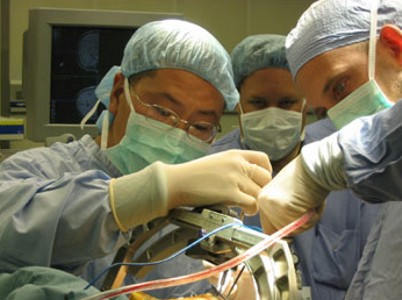.gif) VIARTIS
|
||
|
|
PARKINSON'S DISEASE NEWS
|
|
|
9th August 2011 - New research THE LONG TERM EFFECTS OF DBS ON PARKINSON'S DISEASE Archives of Neurology [2011] Published online August 8
( Researchers assessed the outcome of Deep Brain Stimulation of the subthalamic nucleus (STN-DBS) in people with Parkinson's Disease over a period of 10 years. Deep Brain Stimulation (DBS) involves the use of electrodes that are implanted into the brain and connected to a small electrical device called a pulse generator that can be externally programmed. DBS requires careful programming of the stimulator device in order to work correctly. For more information go to Deep brain stimulation.
E-MAIL NOTIFICATION : If you would like to be notified by e-mail when any new research, news reports, new books, or new resources are added to Parkinson's Disease News, please merely e-mail [email protected] with the message "subscribe". No form of identity is required. E-mail addresses are not used for any other purpose.
Parkinson's Disease News details all significant new research, news reports, new books, and new resources concerning Parkinson's Disease and those medical disorders that often coincide with Parkinson's Disease. It is compiled from an analysis of all newly published research, news reports, new clinical trials, all newly published books, and new web sites. A summary and analysis of the new research are provided, as well as links to the complete abstracts and news reports
|
||
|
|
||
.gif) |
||
| ©2006-2011 Viartis | ||
| 2015-09-06 12:59:10 | ||
| [email protected] | ||
 DBS
improved the Parkinson's Disease symptom score by 25% in comparison to no
treatment, including resting and action tremor by over 85%, and bradykinesia by
23%. It did not stop deterioration in speech, walking, and postural instability,
including falling and freezing. L-dopa dosages reduced to about 63% of what they
were initially. Daily living activity also improved. Dyskinesia and motor
fluctuation scores also remained significantly lower. Potential adverse events
included : a trend to weight loss, visual hallucinations, impulse control
disorders possibly related to dopamine agonists, progressive cognitive decline
culminating in dementia, device related infections.
DBS
improved the Parkinson's Disease symptom score by 25% in comparison to no
treatment, including resting and action tremor by over 85%, and bradykinesia by
23%. It did not stop deterioration in speech, walking, and postural instability,
including falling and freezing. L-dopa dosages reduced to about 63% of what they
were initially. Daily living activity also improved. Dyskinesia and motor
fluctuation scores also remained significantly lower. Potential adverse events
included : a trend to weight loss, visual hallucinations, impulse control
disorders possibly related to dopamine agonists, progressive cognitive decline
culminating in dementia, device related infections.








